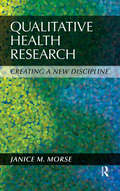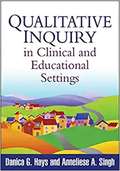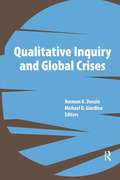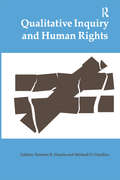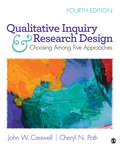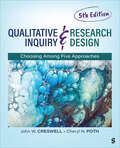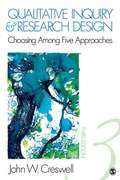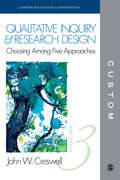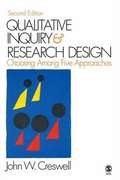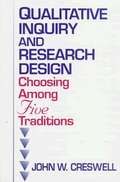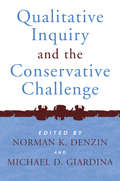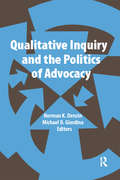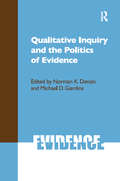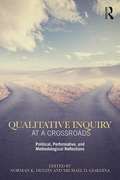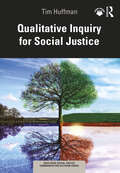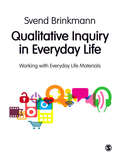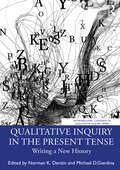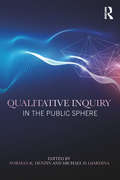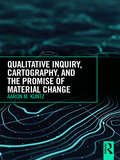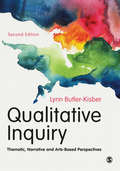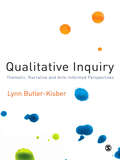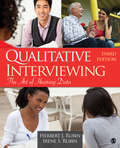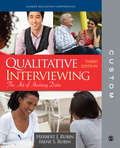- Table View
- List View
Qualitative Health Research: Creating a New Discipline
by Janice M MorseThe leading figure in qualitative health research (QHR), Janice M. Morse, asserts that QHR is its own separate discipline—distinct from both traditional health research and other kinds of qualitative research—and examines the implications of this position for theory, research, and practice. She contends that the health care environments transform many of the traditional norms of qualitative research and shape a new and different kind of research tradition. Similarly, the humanizing ethos of qualitative health research has much to teach traditional researchers and practitioners in health disciplines. She explores how the discipline of QHR can play out in practice, both in the clinic and in the classroom, in North America and around the world. A challenging, thought-provoking call to rethink how to conduct qualitative research in health settings.
Qualitative Inquiry In Clinical And Educational Settings
by Danica G. Hays Anneliese A. SinghThis highly readable text demystifies the qualitative research process—and helps readers conceptualize their own studies—by organizing the different research paradigms and traditions into coherent clusters. Real-world examples and firsthand perspectives illustrate the research process; instructive exercises and activities build on each other so readers can develop their own proposals or reports as they work through the book. Provided are strategies for selecting a research topic, entering and exiting sites, and navigating the complexities of ethical issues and the researcher's role. <P><P> Readers learn how to use a range of data collection methods—including observational strategies, interviewing, focus groups, e-mail and chat rooms, and arts-based media—and to manage, analyze, and report the resulting data. Useful pedagogical features include: *In-class and field activities to apply qualitative concepts. *Discussion questions, proposal development exercises, and reflexive journal activities. *Exemplary qualitative studies and two sample proposals. *Cautionary notes, or "Wild Cards," about possible research pitfalls. *Tables that summarize concepts and present helpful tips.
Qualitative Inquiry and Global Crises (International Congress of Qualitative Inquiry Series)
by Norman K. Denzin Michael D. GiardinaThis plenary volume from the Sixth International Congress on Qualitative Inquiry (2010) highlights the variety of roles played by qualitative researchers in addressing global communities in crisis. It shows how qualitative researchers can bridge gaps in cultural and linguistic understanding to address issues of disparity in race, ethnicity, gender, and environment in the interests of global social justice and human rights. Authored by many of the world’s leading qualitative researchers, the signature articles in this volume point qualitative researchers toward a research stance of ethics, meaning, and advocacy.
Qualitative Inquiry and Human Rights (International Congress of Qualitative Inquiry Series)
by Norman K. Denzin Michael D. GiardinaQualitative researchers are increasingly being called upon to become human rights advocates, to help individuals and communities honor the sanctity of life, and to promote the core values of privacy, justice, freedom, peace, and human dignity. In this volume of plenary papers from the Fifth International of Qualitative Inquiry in 2009, leading qualitative researchers show the various dimensions of the human rights work being done by scholar/activists in the social sciences, education, health care, social services, cultural studies, and other fields.
Qualitative Inquiry and Research Design: Choosing Among Five Approaches
by John W. Creswell Cheryl N. PothIn the revised Fourth Edition of the best-selling text, John W. Creswell and new co-author Cheryl N. Poth explore the philosophical underpinnings, history, and key elements of five qualitative inquiry approaches: narrative research, phenomenology, grounded theory, ethnography, and case study. Preserving Creswell's signature writing style, the authors compare the approaches and relate research designs to each of the traditions of inquiry in a highly accessible manner. Featuring new content, articles, pedagogy, references, and expanded coverage of ethics throughout, the Fourth Edition is an ideal introduction to the theories, strategies, and practices of qualitative inquiry.
Qualitative Inquiry and Research Design: Choosing Among Five Approaches
by John W. Creswell Cheryl N. PothIn the revised Fourth Edition of the best-selling text, John W. Creswell and new co-author Cheryl N. Poth explore the philosophical underpinnings, history, and key elements of five qualitative inquiry approaches: narrative research, phenomenology, grounded theory, ethnography, and case study. Preserving Creswell's signature writing style, the authors compare the approaches and relate research designs to each of the traditions of inquiry in a highly accessible manner. Featuring new content, articles, pedagogy, references, and expanded coverage of ethics throughout, the Fourth Edition is an ideal introduction to the theories, strategies, and practices of qualitative inquiry.
Qualitative Inquiry and Research Design: Choosing Among Five Approaches
by John W. Creswell Cheryl N. PothIn the Fifth Edition of the bestselling text Qualitative Inquiry and Research Design: Choosing Among Five Approaches, John W. Creswell and Cheryl N. Poth guide researchers in selecting the best option for their studies by exploring, evaluating, and applying five qualitative research approaches: narrative research, phenomenology, grounded theory, ethnography, and case study. For each of these qualitative inquiry traditions, the authors explore the philosophical underpinnings, history, defining features, common data procedures, and writing structures. With expanded content reflecting technological developments in the qualitative research process, more inclusivity and diversity in examples, and updated references, the Fifth Edition is an ideal introduction to the theories, strategies, and practices of qualitative research. Winner of the 2018 Textbook & Academic Authors Association′s The McGuffey Longevity Award Included with this title: LMS Cartridge: Import this title’s instructor resources into your school’s learning management system (LMS) and save time. Don’t use an LMS? You can still access all of the same online resources for this title via the password-protected Instructor Resource Site. Learn more.
Qualitative Inquiry and Research Design: Choosing Among Five Approaches
by John W. Creswell Cheryl N. PothIn the Fifth Edition of the bestselling text Qualitative Inquiry and Research Design: Choosing Among Five Approaches, John W. Creswell and Cheryl N. Poth guide researchers in selecting the best option for their studies by exploring, evaluating, and applying five qualitative research approaches: narrative research, phenomenology, grounded theory, ethnography, and case study. For each of these qualitative inquiry traditions, the authors explore the philosophical underpinnings, history, defining features, common data procedures, and writing structures. With expanded content reflecting technological developments in the qualitative research process, more inclusivity and diversity in examples, and updated references, the Fifth Edition is an ideal introduction to the theories, strategies, and practices of qualitative research. Winner of the 2018 Textbook & Academic Authors Association′s The McGuffey Longevity Award Included with this title: LMS Cartridge: Import this title’s instructor resources into your school’s learning management system (LMS) and save time. Don’t use an LMS? You can still access all of the same online resources for this title via the password-protected Instructor Resource Site. Learn more.
Qualitative Inquiry and Research Design: Choosing Among Five Approaches (3rd Edition)
by John W. CreswellIn this book the author explores the philosophical underpinnings, history, and key elements of each of five qualitative inquiry traditions: narrative research, phenomenology, grounded theory, ethnography, and case study.
Qualitative Inquiry and Research Design: Choosing Among Five Approaches (Custom CEC Third Edition)
by John W. CreswellJohn W. Creswell explores the philosophical underpinnings, history, and key elements of five qualitative inquiry approaches: narrative research, phenomenology, grounded theory, ethnography, and case study. The author compares the approaches and relate research designs to each of the traditions of inquiry in a highly accessible manner. <P><P><i>Advisory: Bookshare has learned that this book offers only partial accessibility. We have kept it in the collection because it is useful for some of our members. To explore further access options with us, please contact us through the Book Quality link. Benetech is actively working on projects to improve accessibility issues such as these.</i>
Qualitative Inquiry and Research Design: Choosing among Five Approaches (2nd edition)
by John W. CreswellMany changes have occurred on the landscape of qualitative research, and these changes and my thinking about them are reflected in this second edition.
Qualitative Inquiry and Research Design: Choosing among Five Traditions (1st edition)
by John W. CreswellAn explanation of five approaches to qualitative research.
Qualitative Inquiry and the Conservative Challenge (International Congress of Qualitative Inquiry Series)
by Norman K. Denzin Michael D. GiardinaThis volume is a call to qualitative researchers to respond to the political and methodological conservativism of the new millennium. Based upon the plenary papers at the first International Congress on Qualitative Inquiry, 22 scholars from five countries and many academic disciplines address how qualitative inquiry can maintain its forward-looking agenda, its emphasis on ethical practice, and its stance in favor of social justice in a world where conservatives aggressively control the political system, the university, and grant agency purse strings. Contributions by such noted scholars as Patti Lather, Janice Morse, Linda Tuhiwai Smith, Ernest House, Yvonna Lincoln, and H.L. Goodall, Jr. make this an important benchmark work for all involved in qualitative inquiry.
Qualitative Inquiry and the Politics of Advocacy (International Congress of Qualitative Inquiry Series)
by Norman K. Denzin Michael D. GiardinaThe plenary volume from the Seventh International Congress of Qualitative Inquiry (2011) examines the politics of advocacy and the context in which scholars are encouraged to pursue social justice agendas, be human rights advocates, and do work that honors the core values of human dignity and freedom from fear and violence. Contributions from many of the world's leading qualitative researchers in communications, education, sociology, and related disciplines address topics including community research, transformative education, and researcher ethics, and guide the field toward an engaged, activist research agenda.
Qualitative Inquiry and the Politics of Evidence (International Congress of Qualitative Inquiry Series)
by Norman K. Denzin Michael D. GiardinaWhat is evidence in qualitative inquiry and how is it evaluated? What is true or false in research is strongly influenced by socially defined criteria and by the politics of academia. In providing an alternative to conservative science, qualitative researchers are often victimized by these politics. The use of qualitative evidence within the policy arena is also subject to social and political factors. Within qualitative inquiry itself, evidence is defined differently in different discourses—law, medicine, history, cultural, or performance studies. The interdisciplinary, international group of contributors to this volume address these questions in an attempt to create evidential criteria for qualitative work. Sponsored by the International Center for Qualitative Inquiry.
Qualitative Inquiry at a Crossroads: Political, Performative, and Methodological Reflections (International Congress of Qualitative Inquiry Series)
by Norman K. Denzin Michael D. GiardinaQualitative Inquiry at a Crossroads critically reflects on the ever-changing dynamics of qualitative research in the contemporary moment. We live at a crossroads in which the spaces for critical civic discourse are narrowing, in which traditional political ideologies are now questioned: there is no utopian vision on the horizon, only fear and doubt. The moral and ethical foundations of democracy are under assault, global inequality is on the rise, facts are derided as ‘fake news’—an uncertain future stands at our door. Premised on the belief that our troubled times call for a critical inquiry that matters—a discourse committed to a politics of resistance, a politics of possibility—leading international contributors from the United States, United Kingdom, Australia, Spain, Norway, and Denmark present a range of perspectives, challenges, and opportunities for the field. In so doing, they wrestle with questions concerning the intersecting vectors of method, politics, and praxis. More specifically, contributors engage with issues ranging from indigenous and decolonizing methods, arts-based research, and intersectionality to debates over the research marketplace, accountability metrics, and emergent forays into post-qualitative inquiry.
Qualitative Inquiry for Social Justice (Routledge Social Justice Communication Activism Series)
by Tim HuffmanThis textbook introduces students, researchers, and activists to the practice of qualitative inquiry that contributes to fairness, freedom, and flourishing in community life. The book takes a cyclical approach to research and action by using the metaphor of the four seasons (spring, summer, autumn, and winter) and the day cycle (dawn, day, dusk, and dark) to organize the content and activities. It lays out the step-by-step process of community-based research projects and guides readers in how to plan projects with diverse partners, generate data while participating in direct action, reflect on experiences and analyze complex data, and share insights with others through various modes of writing and presentation. Specific skills include planning, fieldwork, interviewing, thematic analysis, modeling, writing, and presenting. This innovative book provides tools for readers to conduct qualitative research that generates knowledge that can aid policy change, political mobilization, social movements, and organizing to meet universal human needs and rights. The book is tailored to advanced undergraduate and graduate students in qualitative research methods courses in communication studies, sociology, education, social work, and public health and is also useful for professionals who use inquiry in their occupation, such as program design/evaluation, solidarity/solutions journalism, nonprofit leadership, and community development. Online resources, including worksheets, lecture slides, facilitation tools, and sample assignments, are available at www.routledge.com/9780367567651
Qualitative Inquiry in Everyday Life: Working with Everyday Life Materials
by Svend BrinkmannThis book is a 'survival guide' for students and researchers who would like to conduct a qualitative study with limited resources. Brinkmann shows how everyday life materials such as books, television, the internet, the media and everyday conversations and interactions can help us to understand larger social issues. As living human beings in cultural worlds, we are constantly surrounded by 'data' that call for analysis, and as we cope with the different situations and episodes of our lives, we are engaged in understanding and interpreting the world as a form of qualitative inquiry. The book helps its reader develop a disciplined and analytic awareness informed by theory, and shows how less can be more in qualitative research. Each chapter introduces theoretical tools to think with, and demonstrates how they can be put to use in working concretely with everyday life materials.
Qualitative Inquiry in the Present Tense: Writing a New History (International Congress of Qualitative Inquiry Series)
by Norman K. Denzin Michael D. GiardinaIn Qualitative Inquiry in the Present Tense, contributors engage with epistemological and philosophical questions concerning the conduct of qualitative inquiry in the present moment, and especially as it relates to various understandings of writing in/as inquiry.Topics addressed include methodological processes, questions of narrative uprootedness, relational inquiry, Indigenous ethico-onto-epistemologies, storytelling, and transformative writing forms and practices. This is a messy, often unruly collection (in the best way possible) of disparate ideas strung tightly together by literal and metaphorical questions of the research act of writing. Contributors from the United States, Australia, Canada, England, and Scotland imaginatively conceive of new qualitative futures—and how we might write ourselves there.This evocative new book is a must-read for faculty and students alike who are interested in and engaged with questions and ideas oriented toward understanding our current historical present in qualitative research—a moment in which the field is perpetually in motion or in flux, with new theories, methods, and orientations arising, competing, and even contradicting one another.
Qualitative Inquiry in the Public Sphere (International Congress of Qualitative Inquiry Series)
by Norman K. Denzin Michael D. GiardinaQualitative Inquiry in the Public Sphere examines the relationships between public scholarship, the research marketplace, and the politics of higher education. It is written from the perspective that higher education is under attack from multiple sides, both political and economic; that academics reside in a precarious position, one fraught with accountability metrics, funding pressures, and spiralling bureaucracy; and that scientific knowledge itself is increasingly contentious in public. These internal and external pressures have fundamentally transformed the public sphere of higher education from one of rational public discourse by and for the public good to one of private market relations and strategic research decisions. In turn, these transformations have fundamentally altered what it means to be a ‘productive’ scholar within this space—altered what it means to be a public researcher in this space.Leading international voices from the United States, Canada, Germany, the United Kingdom, and Norway collectively present a forceful rebuke to such developments, raising a clarion call to action on topics ranging from scholarly publishing, audit culture, and the privatization of public knowledge to Indigenous, arts-based, and collaborative research methods.Qualitative Inquiry in the Public Sphere is a must-read for faculty and students alike interested in the politics of being a public researcher—of conducting research in and influencing dialogue in the public sphere.
Qualitative Inquiry, Cartography, and the Promise of Material Change
by Aaron M. KuntzWhat are the problems to which materialist methodologies are posed as a solution? In this book, Aaron M. Kuntz maps the impact of materialism on contemporary practices of inquiry in education and the social sciences. Through this work, the author challenges readers to consider inquiry as a mode of ethically engaged citizenship with implications for resisting our contemporary moment towards a more equitable future. The author engages his own inquiry as radical cartographic work, drawing forth distinctions between dialectical and dialogic formations of materialism in order to develop what he terms relational materialism—an engaged orientation to living that dwells in the entangled relations of affirmative ethics and enduring practices of resistance and refusal. Drawing upon examples from higher education, contemporary culture, and normative assumptions of governance, the author considers the potential that we might generate living alternatives to the contemporary status quo; daily practices no longer dependent on binary division or standardized calculations of what "matters." As such, the author advocates for practices of virtuous inquiry (future-orientated ethical assertions of what one should do) that orient inquiry as materially ethical activity. Despite the often-overwhelming state of inequity and exploitation in our contemporary world, Kuntz generates an affirmative ethical stance that we can become relationally different, guided by a virtuous determination to articulate inquiry as the cartographic work of disruption and imagination. This text will prove valuable to graduate students and faculty who take inquiry seriously and seek the means to understand their work as engaged in the necessary challenge for material change.
Qualitative Inquiry: Thematic, Narrative and Arts-Based Perspectives
by Lynn Butler-KisberQualitative inquiry is not merely a research method or a series of analytic steps, but a holistic process that challenges the age-old qualitative/quantitative dichotomy. This book provides students and researchers with an approachable guide to a range of interpretive perspectives, including thematic, narrative, and arts-based types of inquiry. Fully revised and updated, the Second Edition features: A brand new introduction firmly placing qualitative inquiry in context New further reading sections to guide you deeper into the relevant literature Expanded sections on auto-ethnography and technology A range of examples to demonstrate the application of research techniques Presenting a clear overview of the theory, method and interpretation involved in qualitative inquiry, this book is the ideal starting point for those engaging in arts-based qualitative research.
Qualitative Inquiry: Thematic, Narrative and Arts-Informed Perspectives
by Lynn Butler-KisberQualitative Inquiry unites the basics of research design in qualitative research with the practice of analysing qualitative data. This textbook addresses the theory and practice of choosing and designing a qualitative approach and methodological and analytical ramifications that follow from making such choices. It aims to set out the theoretical underpinnings behind different methodological choices and to help students then follow up on (and interrogate) such approaches. Qualitative Inquiry is the ideal starting point for students on research training courses who have opted to develop a qualitative research project. In it, Butler-Kisber introduces students to theory and then demonstrates this theory in practice by showing how a project is actually designed and actually analysed. This book examines theory, method and interpretation in a way that is meaningful to students and new researchers, as well as discussing newer, more avant-garde, developments in qualitative research in arts-based inquiry. It is essential reading for students who are seeking to make sense of their research and their developing theoretical standpoints.
Qualitative Interviewing: The Art of Hearing Data
by Dr Herbert J. Rubin Dr Irene S. RubinUsing in-depth qualitative interviews, authors Herbert J. Rubin and Irene S. Rubin have researched topics ranging from community redevelopment programs to the politics of budgeting and been energized by the depth, thoroughness, and credibility of what was revealed. They describe in-depth qualitative interviewing from beginning to end, from its underlying philosophy and assumptions to project design, analysis and write up.
Qualitative Interviewing: The Art of Hearing Data (Custom CEC Third Edition)
by Herbert J. RubinUsing in-depth qualitative interviews, authors Herbert J. Rubin and Irene S. Rubin have researched topics ranging from community redevelopment programs to the politics of budgeting and been energized by the depth, thoroughness, and credibility of what was revealed. They describe in-depth qualitative interviewing from beginning to end, from its underlying philosophy and assumptions to project design, analysis and write up.
